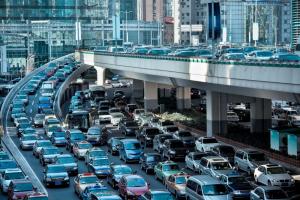
The UN Secretary General’s Special Envoy for Road Safety (Special Envoy) will travel to China to meet representatives from various sectors, advocating for effective implementation of the Global Plan for the Decade of Action for Road Safety 2021-2030 with an aim of halving the number of victims on the road by 2030.
According to the World Health Organization (WHO), China’s road traffic fatality rate was 18.2 per 100,000 population, higher than the Western Pacific regional rate of 16.9 (WHO 2016). Furthermore, the cost of road crashes in China represents 6.2% of GDP (WB, 2016). The country's efforts to improve road safety are very encouraging such as the mandatory use of child safety seats to protect children on the road or the enforcement on speed limits and against drunk driving. However, despite the various measures implemented and a clear downward trend in the number of victims, there is still work to be done to tackle the emerging challenges on Chinese roads.
During the mission, the Special Envoy will visit three cities: Guilin (19 – 21 November), Shanghai (22 – 23 November) and Beijing (24 – 27 November). In Guilin, the Special Envoy will attend the China-ASEAN Mayors Forum and an event for UN Global Compact SDG Innovation Accelerator Learning Center, exploring the important nexus between road safety and other SDGs.
China is facing emerging road safety challenges
In 2016, the World Health Organization (WHO) estimated that there were 256,180 road traffic fatalities in China, the second highest absolute total after India. Faced with the worrying situation, China has implemented several measures over the past years, including prohibiting drunk driving, establishing coordinated rescue mechanisms for road crashes in collaboration with the National Health Commission, reducing air pollution emissions in the transportation sector and launching campaigns to promote the mandatory use of helmets and safety belts. In 2022, the Government announced its 14th Five-Year Plan for National Road Traffic Safety (2021-2025).
In addition, China observed a considerable increase in the use of urban public transport and attached importance to this field: in recent years, China continues its large investment in transport infrastructure and develops intelligent public transportation systems. As for road safety related laws and regulations, progresses are also made, including the compulsory use of child safety seats and national standards for e-bikes. With effective measures, there was a downward trend in road traffic mortality in the country in the last 20 years.
However, while China has seen significant improvement in road safety, its road traffic mortality remains much higher than that in developed countries (the European average is 9.3/100,000 population). Vulnerable road users, such as pedestrians, motorcyclists and pedal cyclists, represent a large proportion of road traffic deaths in the country. Moreover, the growing number of e-bikes is posing a critical challenge to safe mobility. With approximately 300 million e-bikes, China is one of the largest e-bike markets worldwide. From 2013 to 2017, e-bikes have caused more than 56,000 traffic crashes and over 8,000 fatalities. In 2019, e-bike riders accounted for 13.8% of road traffic deaths and 17.4% of road traffic injuries. In consequence, road crashes involving e-bikes have emerged as one of the most important challenges to road safety in China.
Furthermore, as world's largest car market, the country is witnessing a remarkable surge in private car ownership and usage, particularly in its major cities. This trend is fuelled by rapid economic growth and higher household disposable incomes in these urban centers. However, this accelerated urbanization has come at a cost, leading to severe traffic congestion, high levels of air pollution, and significant carbon emissions in many of China's bustling metropolises.
Special Envoy’s call for action
During his visit, the Special Envoy will meet with various stakeholders to discuss the road safety situation in China and explore potential opportunities of addressing the emerging challenges. According to the Special Envoy, further actions are needed to ensure safe and sustainable mobility in the country, including strong enforcement of the mandatory use of helmets, strengthening the post-crash emergency care, launching national road safety awareness campaigns, as well as improving road infrastructure especially in rural and underdeveloped areas.
“On top of the existing causes of road crashes, I have observed the emergence of new road safety challenges in the country, such as the increasing number of e-bikes and traffic congestion,” noted the Special Envoy, Jean Todt. “China being a leader in tech has a huge opportunity to quickly address these issues. This silent pandemic requires that it is placed high on government priorities.”
For further information or media inquiries, please contact Priti Gautam at [email protected] and Stephanie Schumacher at [email protected]
###
About the Special Envoy: Appointed by the UN Secretary General, the Special Envoy for Road Safety is dedicated to advancing road safety initiatives globally. Through strategic advocacy and community engagement, he works to create safer roads, mitigate road traffic injuries, and save lives worldwide.